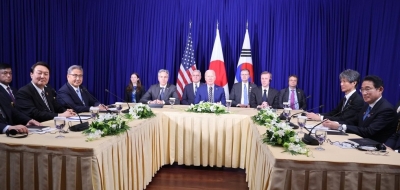
Seoul/Tokyo, Jan 1 (IANS) South Korea and Japan are considering sharing radar information on North Korean missile launches in real time, a Japanese newspaper reported on Sunday, as Pyongyang stepped up missile launches in recent months.
Connecting parts of the two countries’ radar systems via the US Indo-Pacific Command is under consideration to share such information, the Yomiuri Shimbun reported, citing officials in Seoul and Tokyo.
The move could supplement each other’s tracking systems, Yonhap news agency reported.
South Korea is better positioned than Japan to detect North Korean missiles because it is closer to North Korea while Japan is better than South Korea at tracking missiles landing in waters near Japan or in the Pacific Ocean.
Should the envisioned sharing be realised, it could help Japan learn of North Korean missile launches faster so as to improve the reliability of its interception system and help it issue emergency alerts to residents faster.
Currently, South Korea and Japan share information on North Korean missiles under a military intelligence sharing pact, the General Security of Military Information Agreement (GSOMIA), but the sharing is not in real time.
The Yomiuri said Seoul and Tokyo are considering the real-time sharing of such information because of the growing seriousness of North Korean missile and nuclear threats. It also said the United States is strongly pushing for such sharing.
The move came after South Korean President Yoon Suk Yeol and his US and Japanese counterparts, Joe Biden and Fumio Kishida, agreed to share missile warning data in real time to improve each country’s ability to detect and assess North Korean missile threats during a three-way meeting in Cambodia in November.
Seoul’s defence ministry said that based on the trilateral agreement, it will seek to draw up measures to implement it “in a way that benefits all three countries.”
“Should the three countries share missile warning data in real time, we will be able to acquire more accurate information on a North Korean missile’s launch point, flight direction and its point of impact, and thus enhance our response posture,” a ministry official said on condition of anonymity.
–IANS
int/sha




























